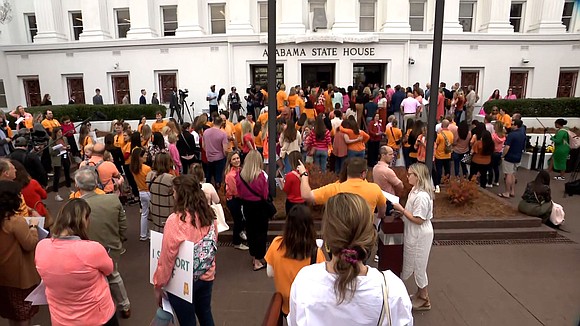Alabama House approves measure; aims to protect IVF after personhood ruling
Devon M. Sayer, CNN | 2/29/2024, 1:33 p.m.

An Alabama House bill aimed at protecting in vitro fertilization treatments advanced on Thursday, just a day after being introduced, as state lawmakers raced to respond to the state Supreme Court ruling that prompted IVF clinics to pause parts of treatments and left many families in limbo.
The bill, known as HB 237, passed out of the chamber with a vote of 94-6 with 3 abstentions. Sponsored by Republican Rep. Terri Collins, the bill “would provide civil and criminal immunity to persons providing goods and services related to in vitro fertilization except acts or omission that are intentional and not arising from or related to IVF services,” according to the synopsis.
The bill would apply retroactively and would be automatically repealed next year. Collins said the goal of the bill is to get IVF clinics to reopen right away.
“This addresses the imminent problem and that is what I am trying to do today. Do we need to have the longer decision? Yes, we do,” she said.
A companion bill, SB 159, is being debated in the state Senate Thursday afternoon. Lawmakers in favor of the measures hope to have legislation prepared for Republican Gov. Kay Ivey’s approval sometime next week.
“The legislature is diligently working on addressing this issue as we speak, and I anticipate having a bill on my desk very shortly,” Ivey said Tuesday.
The bills came less than a week after an unprecedented state Supreme Court ruling said frozen embryos are children and those who destroy them can be held liable for wrongful death. The ruling alarmed patients, health care providers and reproductive rights advocates in the state and beyond, who warned the ruling will send liability costs skyrocketing for IVF clinics and make it more difficult for parents struggling with fertility to have babies.
In vitro fertilization is a common treatment for couples struggling with fertility issues, and about 2% of the US population was conceived using IVF.
During the treatment, an egg is removed from a woman’s body and fertilized with sperm inside a laboratory before being implanted into a woman’s uterus in hopes of leading to pregnancy. The embryos can be frozen for genetic testing or to keep them viable for future use.
To be put into law, a bill must be passed by both the House and Senate and then signed into law by the governor. The Alabama Senate, House and governorship are all controlled by Republicans.
Even after a bill passes, it’s unclear how IVF clinics will respond and whether they will restart treatments.
How the unprecedented ruling came to be
The state Supreme Court ruling, released Friday, stems from two lawsuits filed by three sets of parents who underwent IVF procedures to have babies and then opted to have the remaining embryos frozen.
The parents allege in December 2020 that a patient at a Mobile hospital walked into the fertility clinic through an “unsecured doorway” and removed several embryos from the cryogenic nursery, the ruling said. The patient’s hand was “freeze-burned” by the extremely low temperatures the embryos were stored in and the patient dropped them on the floor, killing them, according to the ruling.
The parents sued for wrongful death, but a trial court dismissed their claims, finding the “cryopreserved, in vitro embryos involved in this case do not fit within the definition of a ‘person’ or ‘child,’” according to the ruling.
But in a stunning reversal last week, the state Supreme Court disagreed, stating “extrauterine children,” or those “located outside of a biological uterus at the time they are killed,” are covered under the state’s Wrongful Death of a Minor law.
The decision is the first known case in which a US court has ruled that frozen embryos are human beings. But several separate actions, including the US Supreme Court’s reversal of Roe v. Wade in 2022, have led to that decision, creating a foundation for the ruling to take place.
Post-Roe, states can decide when life begins, and anti-abortion bills may determine what this means for embryos used for infertility treatments such as IVF.
In 2018, a key constitutional amendment was passed in Alabama declaring that “it is the public policy of the state to recognize and support the sanctity of unborn life and the rights of unborn children.”
Although the amendment was passed to restrict abortions, the Alabama Supreme Court pointed to that 2018 measure to recognize embryos as persons under state law, saying the amendment allowed for a more expansive view of the law at issue in the case.
“When it comes to the Wrongful Death of a Minor Act, that means coming down on the side of including, rather than excluding, children who have not yet been born,” the ruling reads.









